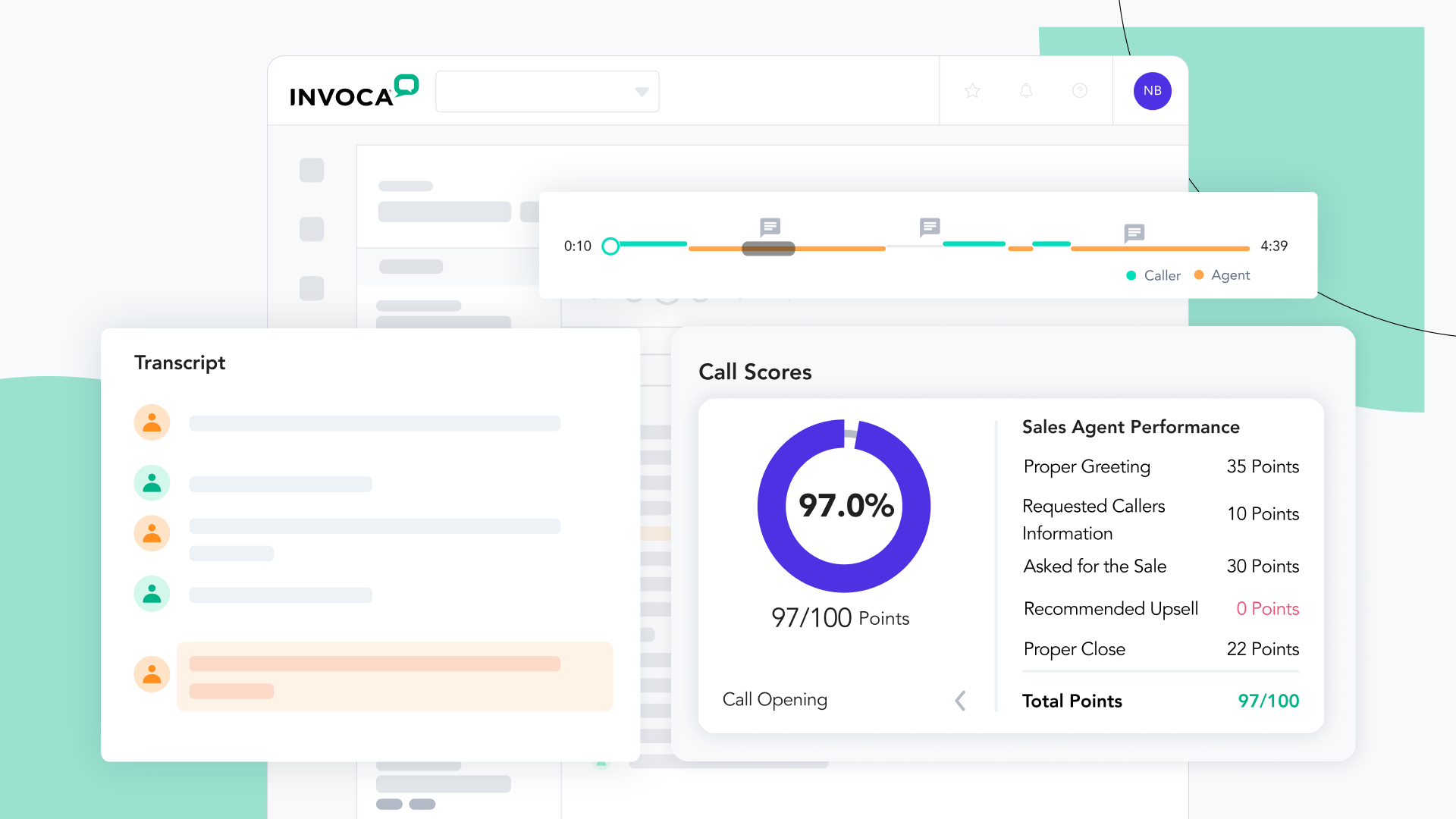- Request a demo
- United States

We live in a digital world where everything, it seems, can be handled online. We order food, arrange deliveries, book travel, shop, and make appointments with all manner of service providers — from dog groomers to mechanics. Yet, despite the internet’s convenience, one traditional channel of communication — the phone — is still the preferred go-to for many people, in many circumstances.
That is particularly true in the healthcare space, where patient calls are a crucial touchpoint for patient engagement. Nearly 90% of prospective patients prefer to call a healthcare provider to make an appointment, rather than submit data via an online portal. Why? Because healthcare is a personal, private matter, and often, urgent matter. For this reason, most leading healthcare entities offer both phone and portal options for patient communication.
Given how many people prefer to use the phone to discuss health-related issues, it is crucial for healthcare entities to have a highly effective approach to handling patient calls. There are clear business benefits that come from getting these interactions right, too. Better communication leads to greater patient satisfaction — and happier patients are likely to become repeat customers and refer family and friends. Plus, investing in the right tools to support patient calls can increase operational efficiency — and save healthcare entities money.
So, how can you get started with enhancing patient communication? This post outlines five strategies that you can implement now to promote better patient calls and deliver a positive patient experience.
The first step toward better patient calls is to put yourself in the patient’s shoes and look at situations from their perspective. This is particularly important at a time when healthcare professionals are being encouraged to pursue patient-mediated strategies. (Patient-mediated strategies involve doctors and physicians raising the quality of healthcare by encouraging patient engagement in healthcare decisions.)
Taking a patient’s feelings and point of view into consideration from the outset helps lay the foundation for more constructive discussions, no matter what the issue is. That’s why empathy — the ability to understand and share the feelings of someone else — is the most important soft skill you can use when dealing with patients. That’s because phone calls, more than any other communication channel, are often emotional. Patients may have real concerns regarding their diagnosis, prognosis, and treatment.
It’s important, then, to really hear what patients are saying throughout the entire patient journey. And one way to ensure that happens is by practicing active listening.
Active listeners are fully present in a conversation. They do not multitask when listening to the speaker. They focus fully on the conversation to understand, not just hear, what the other person is telling them. They are also skilled at picking up on cues, like tone of voice, which can signal how the speaker is feeling, and shed light on what they might be saying “between the lines.”
When the other person is done talking, an active listener will respond by summarizing what they’ve heard. This helps the speaker to feel confident that what they said has been heard and understood.
So, to be a good active listener during patient calls, you will need to:
Another key strategy to deliver better patient calls is to ensure callers have a seamless phone journey. This starts from the moment the phone rings. Be quick to answer patient calls — and never put someone on hold for more than 20 seconds if you can help it. Forcing patients to wait on hold leads to frustration — and worse, abandoned calls.
A good approach is to ask a caller if it’s OK to put them on hold. Then, be quick to return to them, find out why they are calling, and route them appropriately. If they need to be on hold for longer than is ideal, check in to make sure they are fine with continuing to hold — or offer to call them back if their need is not especially urgent.
Better still is using technology to route patient calls swiftly and efficiently as soon as they are received. Invoca’s conversation intelligence software, for instance, tracks the ads, keyword search terms, and website pages that each patient interacted with before they placed a call. Invoca uses this information to dynamically route callers to the right department. You can also set voice-activated Interactive Voice Responses (IVRs) with Invoca to allow callers to select how and where their calls are routed.
Health entities use Invoca for healthcare call tracking so they can improve the patient call experience by routing them appropriately at the first request. Cleveland-based University Hospitals, for example, uses Invoca to create seamless digital-to-call experiences. This has led to heightened patient communication, an almost 60% increase in scheduled appointments, and timesaving of 40 hours per week among the provider’s scheduling staff.
An effective quality assurance (QA) program for patient phone calls can help healthcare entities identify areas for improvement and raise the level of success for staff taking those important calls. QA can be tricky, though; if managers of the teams handling these important patient interactions rely on manual analysis and scoring of a relatively small sample of patient calls, it can skew results.
Using AI and automation can raise the performance of your QA program — and your staff, whether they work at your practice or are stationed in a call center. You can track, analyze, and score calls more efficiently and at scale. Christus Health Plan, as an example, uses Invoca’s AI software solution to eliminate the heavy lifting from QA. Since deploying Invoca, Christus has been scoring every phone call, not just a sample, and estimates that managers now spend 50% less time scoring calls. That gives them more time to spend coaching agents.

Invoca’s AI quality assurance automatically analyzes and scores 100% of calls — even if they are outsourced to a call center — to identify areas for improvement and ensure agents are meeting your key performance indicators (KPIs) for successful calls. What’s more, there is no waiting around to get those scores. They are available with recordings and transcripts as soon as a call ends.
You can use scores and insights provided through the automated QA process to train your staff to deliver better patient calls. When you have well-trained staff interacting with patients, enhanced communication is assured. This leads to higher patient satisfaction and contributes to a more positive patient journey, which also means better outcomes for the patient and the hospital.
The immediacy of call analysis and AI scoring with tools like Invoca means managers can provide coachable moments to staff in real time. Adjustments can be made “on the fly,” so that the very next call can be handled differently—and better. Managers can receive alerts as soon as call-handling issues emerge and monitor staff response. Or they can dive in to assist and seize a critical teaching moment.
Ultimately, using AI means managers spend less time unearthing issues and more time working to solve them, which enhances the overall patient experience.
Invoca’s automated QA also supports healthcare entities in another critical area: compliance. Call compliance is critical for the industry, and the ability to monitor calls securely means that hospitals and other healthcare providers can confidently meet the requirements of the Health Insurance Portability and Accountability Act (HIPAA), General Data Protection Regulation (GDPR), and other key mandates with visibility into 100% of calls, including from covered entities. Managers of team members handling patient calls can immediately see where compliance issues exist and provide targeted training to staff.
One valuable way that healthcare entities can use call transcripts and recordings for coaching is as scripts for role-playing scenarios. Managers can instruct Invoca’s AI to look for specific patterns or outcomes that can then be used as the basis for training.
For example, you might develop a role-playing exercise to help your agents learn how best to explain a particularly complex aspect of insurance coverage which, as you’ve gleaned through analysis of phone call data, patients frequently seek more clarification about.
A surefire way to improve the call experience for patients is to collect and act on their feedback. Feedback can be gathered in many ways, both passively and actively. In an active customer feedback program, patients could be asked directly for feedback, such as completing a short survey, either verbally after a call or via an email follow-up. You can also conduct customer interviews to get specific feedback on a product or service. Taking it one step further, you can set up formal focus groups with patients.
One rich vein of customer feedback to tap is the actual conversations that your staff have with your patients. Even routine conversations, like asking for directions to an office or scheduling an appointment, often contain vital customer feedback and sentiment.
Using AI and automation, conversations in patient phone calls can easily be sifted, analyzed, and sorted for actual feedback. For example, you can set up Invoca’s AI conversation analytics to group keywords that point to customer feedback and sentiment like “satisfaction,” “disappointment,” and “supervisor.”
Establishing a formal customer feedback program with clear goals, systems, and a regular schedule can help healthcare entities provide a positive experience for their patients.
Customer feedback is a valuable tool for training employees to deliver better patient calls. Regular review of feedback can inform staff of new trends and patient concerns, expose shortcomings in call response and handling, and allow managers to set up specific training to help fix these issues.
There are serious legal and ethical considerations to consider when dealing with patient phone calls. Patients’ privacy and other rights in the United States are enshrined in legislation such as HIPAA and patient’s protected health information (PHI), which must be safeguarded. Patients are also protected by rigorous professional standards for conduct as well as ethical considerations.
It’s important to make sure that on-site staff members or agents in call centers who are tasked with answering patient calls do so within the confines of these legal and ethical standards. Failure to comply can lead to stringent sanctions, hefty fines, reputation damage, and even market loss.
Using conversation intelligence software from Invoca that is fully HIPAA-compliant can help healthcare entities avoid missteps in patient calls that can lead to legal and ethical hot water. Invoca’s AI automatically scans calls for compliance issues, ensuring complete protection of PHI. Invoca also offers a business associate agreement to protect sensitive patient data at rest and in transit.
Improving patient communication helps to elevate patient engagement in the healthcare experience, which is crucial for better outcomes. Little things can make a big difference. Professionals in the field will tell you that doctors and physicians who sit down and speak softly with patients, listen attentively, and don’t try to cut the conversation short or pepper it with “medical speak” are the most successful at patient engagement. The same applies when dealing with patients by phone.
Adopting the right technology can support your efforts to have more effective phone conversations with patients. From automatically routing calls to the right respondent at the first attempt, to scoring QA in real time, and providing valuable training material for staff members handling calls, AI-powered technology can help streamline call response times and handling — and increase patient satisfaction.
With Invoca, healthcare entities can:
Your healthcare business can achieve all this, and more, with Invoca while also maintaining compliance with HIPAA and other key mandates. See how it works in the video below:
Want to discover how Invoca can help you improve patient satisfaction? Check out these resources:
To learn more about how Invoca’s conversation intelligence and other capabilities can help your healthcare organization achieve better calls with patients, get in touch with us today to schedule a demo.

